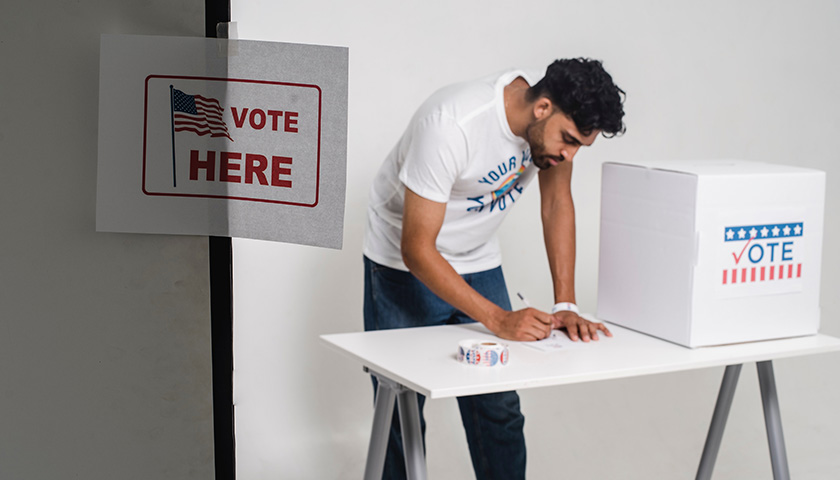Iowa and Ohio are the latest states looking to leave the Electronic Registration Information Center (ERIC), the controversial interstate voting data partnership.
Already seen as suspect by conservatives questioning ERIC’s left-leaning ties, the organization has been inflexible to changes called for by Ohio and other Republican-led states.
The signaled departures by Iowa and Ohio bring to seven the states that have left or are looking to leave the partnership.
ERIC’s board of directors met last week to consider requested changes, including more autonomy for individual members to do what they choose with the voter data collected. Some members also want to end a mandate in ERIC’s bylaws requiring states to notify unregistered voters and remind them to register.
The board, made up of representatives from more than two dozen states and the District of Columbia, voted the proposed changes down.
Iowa Secretary of State Paul Pate said he’s disappointed in the direction ERIC has taken. With the exodus of states to date, and more expected, Pate said the voting data-sharing organization is losing its viability.
“Today’s failed vote to amend the membership agreement doesn’t allow each member to do what’s best for their respective state,” Pate, a Republican, tweeted. “Ultimately, the departure of several key states and today’s vote is going to impact the ability for ERIC to be an effective tool for the state of Iowa.”
“My office will be recommending resigning our membership from ERIC,” he added.
A statement in regard to Iowa’s ERIC membership: pic.twitter.com/Xx372YWhGT
— Iowa Secretary of State Paul Pate (@IowaSOS) March 17, 2023
The Electronic Registration Information Center is a non-profit organization “with the sole mission of assisting states to improve the accuracy of America’s voter rolls and increase access to voter registration for all eligible citizens,” according to ERIC’s website. State elections officials periodically send to ERIC voter registration information and driver’s license data to identify voters who have died, relocated, or have duplicate registrations.
ERIC launched in 2012 with seven state members.
As of November, 32 states and D.C. were in the partnership. In recent months Florida, West Virginia, Missouri, Louisiana, and Alabama announced their departures, raising concerns the organization is politically tainted by liberal money and left-leaning leaders.
“I cannot justify the use of Ohio’s tax dollars for an organization that seems intent on rejecting meaningful accountability, publicly maligning my motives, and waging a relentless campaign of misinformation about this effort,” Ohio Secretary of State Frank LaRose wrote in his letter to begin the process of withdrawal.
Election bureaucrats and left-leaning voter rights groups laud ERIC as the “epitome of effective collaboration and smart election administration.” But critics have raised questions about the money that launched the network and the impartiality of its founder and ex-officio member David Becker.
ERIC was established by Pew Charitable Trusts, a left-of-center nonprofit advocacy and grantmaking organization, according to InfluenceWatch. Pew has received funding from Open Society Foundations, the left-wing cash box of liberal cause sugar daddy George Soros.
The development of ERIC was led by David Becker, the former director of the left-of-center People for the American Way. That organization was launched in 1981 by liberal Hollywood television producer Norman Lear, ostensibly to oppose the conservative principles espoused by Christian conservative televangelists.
Becker now heads the Center for Election Innovation & Research, which has done as much as any group to make enemies out of so-called “election deniers.” In August 2020, Facebook founder and billionaire Mark Zuckerberg and his wife, Priscilla Chan, announced they were donating nearly $70 million to CEIR, a sum 50 times larger than the organization’s 2017 revenues, according to InfluenceWatch. Zuckerberg and Chan dumped hundreds of millions of dollars into so-called safe election grants, the lion’s share going to Democrat-leaning cities in political battleground states. Democrat operatives and liberal activists were embedded in election offices leading up to and through the bitter 2020 presidential election.
“Any organization has to be really careful about thinking that you can respond to bullies and conspiracy theorists by capitulating to them,” Becker told NPR in an interview last month. “A variety of elected officials have thought they could just give the mouse a cookie and it’ll go away. The mouse never goes away.” He said he would not accept re-nomination to his current position as the sole non-voting board member. ERIC’s board voted last Friday to eliminate those positions completely.
Iowa’s Secretary of State said states are leaving ERIC because they have grown tired of the organization telling them how to run their elections instead of letting them choose the appropriate ERIC tools that worked best within their states.
“Our office would never tell other states how to conduct their elections. Additionally, we would never accept other states or the federal government dictating how Iowa should conduct our elections,” Pate said.
“ERIC was only one of many tools used to update and maintain Iowa’s voter registration list. Our office will continue to look at ways to maintain clean, accurate voter rolls and look at new options for obtaining valuable data.”
– – –
M.D. Kittle is the National Political Editor for The Star News Network.
Photo “Election Day” by Sora Shimazaki.









Do so nationwide Hooray
Knowing it’s ideology and a George Soros connecting, why would any Red State trust this ERIC left wing vote counting? It’s surprising that anyone of the right trust this company?